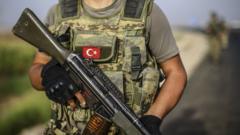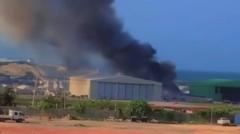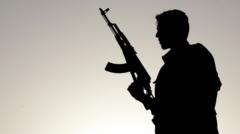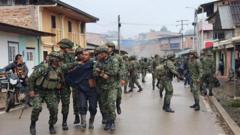The Baloch Liberation Army intensified its separatist efforts with a dramatic train hijacking in Pakistan, holding hostages for 36 hours before a military rescue. This incident underscores the long-standing conflict over Baloch autonomy, rooted in marginalization and a desire for independence.
Balochistan's Fight for Independence: The Crisis of the Baloch Liberation Army

Balochistan's Fight for Independence: The Crisis of the Baloch Liberation Army
The Baloch Liberation Army's recent train hijacking highlights ongoing tensions in Pakistan's Balochistan Province, revealing a push for independence amid historical grievances.
In a bold move that has escalated tensions in southwestern Pakistan, the Baloch Liberation Army (B.L.A.) successfully hijacked a passenger train earlier this week. For approximately 36 hours, the passengers were held hostage, triggering a swift military response that culminated in the eventual rescue of the captives and the reported deaths of over 30 militants on the B.L.A. side.
The B.L.A. is a militant separatist organization advocating for an independent Baloch state in Pakistan's Balochistan Province. Over the years, the group has ramped up its insurgent activities, striking at security forces, public infrastructure, and foreign investments, particularly from China. This brazen hijacking marks a significant escalation in their tactics and serves as part of a protracted struggle that has been underway in one of Pakistan's most tumultuous regions.
Understanding the context of this conflict requires insight into the Baloch people themselves, an ethnic group that inhabits Balochistan, parts of southeastern Iran, and southern Afghanistan. They possess a rich cultural and linguistic heritage, with the Balochi language belonging to the Iranian linguistic family. This group has historically practiced a semi-nomadic lifestyle, guided by traditions that emphasize self-governance and autonomy.
Many Baloch nationalists express that their region has suffered from systematic neglect by national administrations, leading to widespread feelings of economic disenfranchisement, political marginalization, and military oppression. Quetta, the capital of Balochistan, stands at the heart of the region's conflict, being strategically situated near the Afghan border, making it a central location for trade, politics, and security operations.
Despite being Pakistan’s largest province by land area—constituting approximately 44 percent of the country's total territory—Balochistan has a modest population, accounting for only about 6 to 7 percent of Pakistan's populace. This demographic imbalance, when coupled with historical grievances, significantly complicates the social fabric and security dynamics of the region.
The recent hijacking incident continues to draw national and international attention to the plight of the Baloch people, highlighting the urgent need for dialogue and potential solutions to address their demands for autonomy and rights. As the situation develops, the B.L.A.'s actions serve as a stark reminder of the ongoing tensions underlying the pursuit of independence within Balochistan.





















